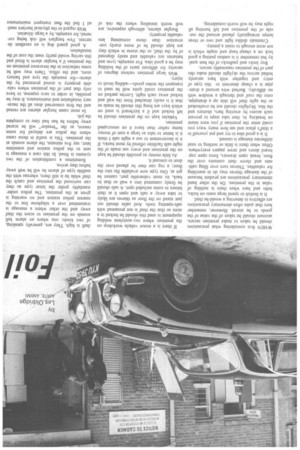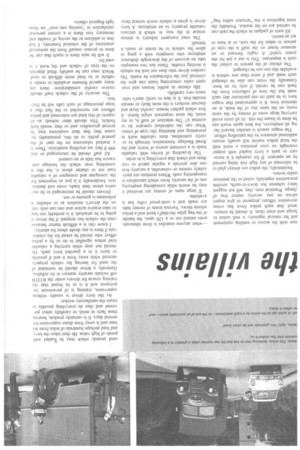Foil
Page 44

Page 45

If you've noticed an error in this article please click here to report it so we can fix it.
the villains
by Les Oldridge
AiikTE, AMIN] I WHEN first considering what precautions should be taken to make premises secure, account should be taken of the value of the goods to be stored. However, remember here that quite often elementary precautions are effective in deterring a would-be thief.
It is foolish to spend large sums on locks, bolts and bars when there is nothing of value in the premises. On the other hand elementary precautions are prudent because of the damage thieves may do in searching for valuables. Thieves turn over filing cabinets and throw their contents over the floor, break open drawers, force open cupboard doors and strew papers everywhere. Often when there is little or nothing to steal deliberate damage is caused.
It is a good idea to try and put yourself in a thief's place and see how many ways you could enter the premises if you were intent on breaking in, then take steps to prevent such access by erecting bars, shutters and the like. Skylights should not be overlooked as the agile thief will shin up a drainpipe, onto the roof and through a window with no difficulty. Barbed wire around a drainpipe is a cheap deterrent to this type of entry and together with bars securely bolted across the skylight should make this part of the premises reasonably secure.
Buy locks and padlocks of the best quality but remember it is useless putting a good lock on a cheap hasp and staple which is not stout enough to resist a jemmy.
Criminals dislike light and two or three lamps strategically placed around the outside of the premises and left burning all night may be well worth considering. If there is a motor vehicle workshop on the premises where oxy-acetylene welding equipment is used this should be locked in a store so that the thief is not presented with safe-opening tools. And safes should not just stand on the floor as thieves are likely to take away a safe and open it at their leisure in some secluded spot. A safe should be firmly cemented into a wall so that its back, its most vulnerable part, cannot be got at. One type now available fits into the floor; a rug can then be placed over the door to conceal it.
As little money as possible should be kept on the premises and every use made of the night-safe facilities offered by most banks. If it is inconvenient to use a night safe I think it is better to take as large a sum of money home rather than leave it on unoccupied premises.
Vehicles kept on the premises should be left locked and if a keyboard is used on which keys are hung this should be made so that it is easily detached from the wall and locked away each night. Lorries parked on the premises could quite well be used to transport the stolen goods—adding insult to injury.
With large premises various degrees of security for different parts of the building may be a good idea. For example, tyres and batteries are valuable and easily disposed of by the thief, so the stores in which they are kept should be of more sturdy construction than those containing less valuable property.
Burglar alarms, although expensive, are well worth installing where the risk of theft is high. They are, generally speaking, of two kinds: one where an alarm bell sounds on the premises to scare the thief away and the other where a message is transmitted over a telephone line to the nearest police station and no warning is given at the premises. The police understandably prefer the latter type as they can surround the premises and catch the thief while he is still there, whereas with the audible type of alarm he will be well away before they arrive.
Sometimes a combination of the two systems is fitted. In this case a message is sent to the police station and sometime later, say five minutes, the alarm sounds at the premises. This is useful in those cases where the police are delayed for some reason, as the "breaker" will be scared away before he has had time to complete the job.
In most cases burglar alarms are rented and the firm concerned does all the necessary installation and maintenance. It may be possible, in order to save expense, to have only that part of the premises where valuable property is stored protected by the alarm—for example the tyre and battery store, and the office. There may well be some reduction in the insurance premium on the premises if a burglar alarm is fitted and this saving would partly meet the cost of the installation.
A good guard dog is an excellent deterrent. Few burglars will risk being cornered, for example, by a large Alsatian.
With regard to the physical barriers needed I feel the fleet transport maintenance nan with his access to welding equipment and his natural ingenuity is well suited to lesign and erect them. It should be rememaered that each police force has crime arevention Officers prepared to give expert advice on any security matter free of :large. Practical men, they will not suggest Fancy schemes but down-to-earth, sensible precautions especially suited to the premises under review.
Incidentally, the police are always glad to be informed of any high risk being carried by an operator. If for example it is necessary to park a lorry loaded with copper overnight on your premises a word with the local police station will usually ensure additional attention by the patrolling officer.
The wages snatch is another hazard facing all employers, but here again much can be done to lessen the risk. At all costs avoid carrying large sums of money by the same route, on the same day of the week, at an identical time. It is appreciated that wages have to be paid on one particular day each week but the time of collection from the bank can be varied, if only by an hour. Generally the route can also be changed each week and if more than one vehicle is available this too can be changed.
The choice of the person to collect the cash is important. This is not a job for the junior typist! A rugby forward or an amateur boxer on the staff is the type of person to select for the task, or at least to act as escort.
All sorts of gadgets in which the cash can be carried are on the market. Probably the most ingenious is the "arrestor safety bag" —when anyone snatches it three telescopic arms extend out to a 12ft span, the handle of the bag grips the thief's hand and a police whistle blows. Various kinds of money belts are made and a cosh-proof trilby hat is available.
If large sums of money are involved it may be worth while considering employing one of the security firms which specializes in transporting cash. Where premises are particularly remote or vulnerable, a security firm can also provide a regular patrol to visit them and check that everything is in order.
The hi-jacking of lorries with valuable loads is a constant source of worry and the Road Haulage Association, through its security committee, does valuable work in preventing and detecting this type of crime. What can the individual operator do to combat it? The selection of staff is, to my mind, the most important single factor. A firm which gathers honest, careful, loyal and discreet workers is the most likely to remain trouble-free. It is best to verify men's references very carefully.
Idle chatter in public houses and transport cafes concerning loads can give the criminal just the information he wants. The careless driver who does not lock his vehicle is inviting trouble. These last two examples take no account of the downright dishonest employee who conspires with a gang to allow his vehicle to be stolen or steals it himself.
The road transport industry is almost unique in the way in which it entrusts valuable property to an employee. A lorry driver is given a vehicle worth several thou
sand pounds which may be roaded with goods of high value. He then takes the lorry and load perhaps hundreds of miles from his base and is away from direct supervision for several days. It is certainly prudent, bearing these facts in mind, to carefully select per sonnel and then do everything possible to retain the satisfactory worker.
As the lorry driver is usually without supervision, training is of paramount importance and it is to be hoped that the training course for drivers under the RTITB will include security matters in its syllabus. Generally a driver should be reminded of the need for leaving his vehicle properly secured while away from it and if possible to leave it in a guarded lorry park. lie should not stop while carrying a valuable load unless signalled to do so by a police officer who should be asked for his creden tials if there is any doubt about his identity.
I know this is a difficult rhatter because once the vehicle has stopped, if the driver is going to be attacked, it is probably too late to take evasive action and one can only rely on the driver's intuition as to whether a policeman is genuine or not.
Drivers should be encouraged to be secretive about their loads, route and destination. Incidentally it is just as important for the consignee and consignor of a valuable load not to chatter about it, but this is something over which the haulage contractor has little or no control.
Al] staff should be encouraged to dial 999 if they see anything suspicious. There is a marked reluctance on the part of the general public to do this, presumably because they fear their suspicions may be proved groundless and so they would look foolish. This should deter nobody as all reports of this kind are welcomed and police officers are reconciled to the fact that a large percentage of such calls will be fruitless.
The security of the vehicle itself should receive careful consideration: there arc many special fitments available to render a vehicle or its load more difficult to steal. Which ones can be usefully fitted depends on the type of vehicle and the work it is used for.
It will be seen there is much that can be done to protect oneself from the unwanted attentions of the criminal fraternity. I feel that in addition to the saving of trouble and monetary loss there is a certain personal satisfaction in "putting one over" on these light-fingered villains.




































































































